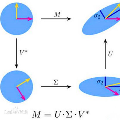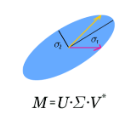We investigated some difficulties that students often face when studying linear algebra at the undergraduate level, and identified some common mistakes and difficulties they often encountered when dealing with topics that require algorithmic thinking skills such as matrix factorization. In particular, we focused on (orthogonal) diagonalization and singular value decomposition (SVD). We also offered the possibility of exploring these topics using SageMath, a Python-based free open software computer algebra system (CAS) that has been identified to be useful for assisting many students in the computational process even though its output is static by nature. We then explored dynamic ChatGPT by inquiring the chatbot about the topic, either by asking to provide an example or to solve a problem, that is by constructing an (orthogonal) diagonalization or SVD from a particular matrix. By consolidating essential concepts in linear algebra and improving computational skills through effective practice, mastering these topics would become easier and mistakes could be minimized. Static SageMath, in particular, is a great aid for calculation confirmation and handling tedious computations. Although dynamic ChatGPT is relatively unreliable for solving problems in linear algebra, the mistakes it produces could become a valuable tool for improving critical thinking skills.
翻译:我们研究了本科阶段学生在学习线性代数时经常遇到的一些困难,并确定了他们在处理需要算法思考技能的主题(如矩阵因子分解)时经常遇到的一些常见错误和困难。特别是,我们专注于(正交)对角化和奇异值分解(SVD)。我们还提供了使用SageMath的可能性,这是一个基于Python的免费开源软件计算机代数系统(CAS),尽管其输出本质上是静态的,但已被证明对许多学生在计算过程中提供了帮助。然后,我们通过询问聊天机器人有关主题的内容,探究了动态ChatGPT,例如要求提供示例或解决问题,即从特定矩阵构造(正交)对角化或奇异值分解。通过巩固线性代数中的基本概念和提高计算技能的有效实践,掌握这些主题将变得更容易,并且可以尽量减少错误。特别是,静态SageMath是计算确认和处理繁琐计算的良好辅助工具。虽然动态ChatGPT在解决线性代数问题方面相对不可靠,但它产生的错误可能成为提高批判性思维能力的有价值工具。





